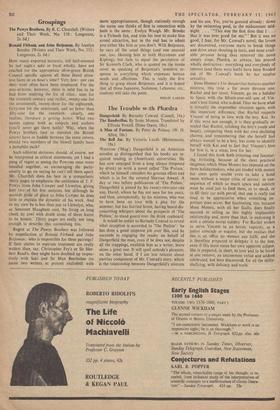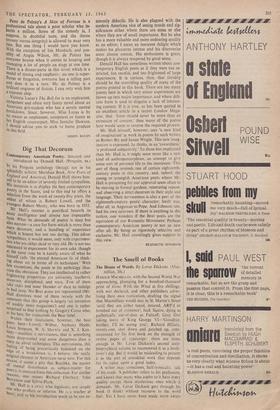The Trouble with Phaedra
WINSTON (`Mug') Dangerfield is an American novelist so distinguished that his books are re- quired reading in (American) universities. He has now emerged from a long silence (imposed by drink) to write a novel called 'The Prelate,' which he himself considers his greatest effort and which is in for the coveted Shavian Award. A day or two before publication of 'The Prelate,' Dangerfield is joined by his twenty-two-year-old son, David, whom he has not seen for ten years, and then, unexpectedly, by his mistress, who was to have been on tour with a play for the summer, but has hurried home, having heard dis- concerting whispers about the prospects of 'The Prelate,' to stand guard over the drink cupboard.
It would be unfair to Barnaby Conrad to reveal what reception is accorded to 'The Prelate': he has done a good suspense job over this, and he succeeds in engaging the reader on behalf of Dangerfield the man, even if he does not, despite all the trappings, establish him as a writer, leave alone a great one. It will spoil nobody's pleasure, on the other hand, if I am less reticent about another component of Mr. Conrad's story, which is the relationship between Dangerfield's mistress and his son. Yes, you've guessed already: down by the swimming pool, in the midsummer mid- night. . . . ' "This was the first time that I . • that it was ever good for me."' But it was no good, I fear, for Mr. Conrad's novel; the lovers are discovered, everyone starts to break things and drive away shouting in taxis, and most avail- able persona being thus removed the novel simply stops. Phxdra, as always, has proved wholly destructive: everything and everybody of interest (and there were both) have been flooded out of Mr. Conrad's book by her surplus sexuality.
Irene Monesi 's 7 he Banderillasteatures another mistress, this time a far more devious one. Rachel and her lover, Vincent, go on a holiday to Spain with the fifteen-year-old son of Vin- cent's best friend, who is dead. Thus we have what is virtually the stepmother situation again, with this important difference, that Rachel suspects Vincent of being in love with the boy, Kai. As if this were not enough, it is then gradually re- vealed that Rachel, relishing the boy's youth and beauty, comparing them with her own declining charms, and remembering that she herself bad always wanted to be a boy, has come to identify herself with Kai and to feel that Vincent's love for him is, in a sense, love for her.
I found this book both irritating and fascinat- ing. Irritating, because of the sheer practical ineptness which Mme Monesi has imposed on the three holidaymakers, who are loaded with money but seem quite unable even to take a hotel room without a major crisis of nerves: in con- sequence of which so much space and subtlety must be used just to feed them, so to speak, or to fill their car with petrol, that one is really too tired to be appreciative when something im- portant does occur. But fascinating, too; because Mme Monesi, with all her faults, does finally succeed in selling us this highly implausible relationship and, more than that, in endowing it with a certain moral validity For Rachel wishes to serve Vincent in an heroic capacity, as a junior comrade or esquire; but she realises that this is an office no woman can fulfil, and she is therefore prepared to delegate it to the boy, even if this must mean her own apparent eclipse. She is prepared, in short, to love and to be loved at one remove, an uncommon virtue and seldom celebrated, but here discovered, for all the shilly- shallying, with delicacy and truth. Peter de Polnay's A Man of Fortune is a professional tale about a poor scholar who in- herits a million. Some of the comedy is, I suppose, in doubtful taste, and the theme (money versus integrity) is allowed to wear very thin. But one thing I would have you know. With the exception of Iris Murdoch, and pos- sibly of Angus Wilson, Mr. de Polnay has everyone beaten when it comes to keeping and managing a lot of people on stage at one time. There is a dinner-party in this novel which is a Model of timing and emphasis: no one is super- fluous or forgotten, everyone has a telling part and does it to a turn. Mr. de Polnay is a brilliant engineer of fiction; I can only wish him a trimmer ship. 'Victoria Lucas's The Bell Jar is an unpleasant, competent and often very funny novel about an American girl-student who has a severe mental breakdown. Since, however, Miss Lucas is by no means as unpleasant, competent or funny as her English counterpart, Miss Jennifer Dawson, 1 should advise you to stick to home produce in this field.
SIMON RAVEN



































 Previous page
Previous page